Handsome Alfred Gerasch (1877-1954) was a popular Austrian stage actor who belonged to the exclusive circle of the ‘Königlich-Kaiserlichen Hofschauspielern’ (Royal Court Actors). He also acted in several silent and sound films, often playing historical figures.
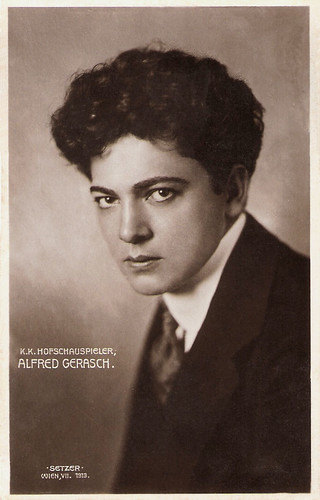
Austrian postcard by Postkartenverlag Brüder Kohn, Wien (Vienna). Photo: Setzer, Wien, 1913.
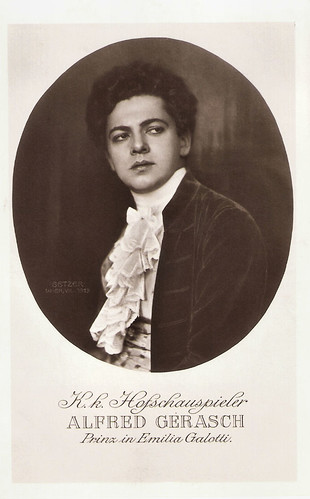
Austrian postcard by Postkartenverlag Brüder Kohn, Wien (Vienna). Photo: Setzer, Wien, 1913. Caption: "Prinz in Emilia Galotti." (Prince in Emilia Galotti). Emilia Galotti is a play in five acts by Gotthold Ephraim Lessing (1729–1781), which premiered on 8 March 1772 in Braunschweig (Brunswick). The work is a classic example of German 'bürgerliches Trauerspiel' (bourgeois tragedy). Lessing's work comprises an attack against the nobility and its powers. Lessing depicts aristocrats as having unfair powers in society and as ruining the happiness of the emerging middle class.
Alfred Arthur Max Gerasch was born in Berlin in 1877. He took drama lessons from the singer, actor and temporary head director of the Berlin Victoria-Theater, Wilhelm Hock. Gerasch made his stage debut in 1896 at the Bellevue Theatre in Stettin, now Szczecin in Poland. In 1897 he moved to Hamburg, and later to Oldenburg and to Karlsruhe.
In 1907, he went to Vienna, where Paul Schlenthe had appointed him an ensemble member of the famous Burgtheater. He became very popular among the Viennese theatre audiences as the young hero and lover in plays like 'Romeo and Juliet' by William Shakespeare and 'Don Karlos' by Friedrich Schiller.
Many great roles in the classic plays followed including Orest in 'Iphigenia in Tauris' by Johann Wolfgang von Goethe. The charismatic Gerasch was named ‘kaiserlich und königlichen Hofschauspieler’ (Royal Court Actor). He celebrated triumphs as Duke Orsino in the Shakespeare comedy 'Twelfth Night', as Ferdinand in Schiller's Kabal und Liebe (Cabal and Love) and as Prince of Guastalla in 'Emilia Galotti'. Gerasch covered the entire spectrum of classical heroes, but was also convincing in modern plays, for example in the tragicomedy 'Das weite Land' by Arthur Schnitzler in 1911.
In 1919, the then 42-years actor made his film debut in the role of the son of the main character in the Austrian production Adrian Vanderstraaten (Robert Land, 1919), followed by films like Durch die Quartiere des Elends und Verbrechens/Through the Neighborhoods of Misery and Crime (Robert Land, 1920) and Eine Million Dollar/One Million Dollar (Jacob Fleck, Luise Fleck 1921). He returned to Berlin where he worked both for the stage and for the film industry during the 1920s.
In Joe May's melodrama Die Legende von der heiligen Simplicia/The Legend of Holy Simplicity (Joe May, 1920), he attracted the attention of cinema audiences as the knight Rochus, who tries to dissuade 'Saint Simplicia’ (Eva May) from her path. While Joe May cast Gerasch as the partner of his daughter Eva, the handsome actor appeared a little later alongside May's wife Mia May as Viscount Gaston de Cardillac in the tragedy Die Schuld der Lavinia Morland/The Guilt of Lavinia Morland (Joe May, 1920). Gerasch also appeared in Dagfin (Joe May, 1926) with Paul Richter, Eine Dubarry von heute/A Modern Dubarry (Alexander Korda, 1927) featuring María Corda, and Königin Luise, 2. Teil/Queen Luise, part 2 (Karl Grune, 1928) with Mady Christians.
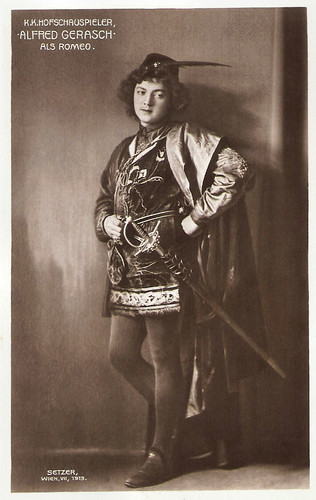
Austrian postcard by Postkartenverlag Brüder Kohn, Wien (Vienna). Photo: Setzer, Wien, 1913. Caption: "Alfred Gerasch als Romeo." (Alfred Gerasch as Romeo). Publicity still for a stage production of the play Romeo and Juliet by William Shakespeare.
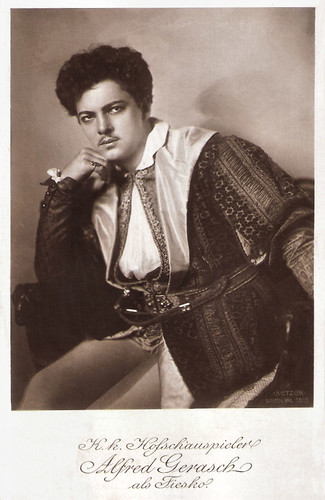
Austrian postcard by Postkartenverlag Brüder Kohn, Wien (Vienna), no. 887-1835. Photo: Setzer, Wien, 1913. Caption: K.k. Hofschauspieler Alfred Gerasch als Fiesko. Die Verschwörung des Fiesco zu Genua/Fiesco was the second full-length play by Friedrich Schiller. It is a republican tragedy based on the historical conspiracy of Giovanni Luigi Fieschi against Andrea Doria in Genoa in 1547. It premiered in Bonn in 1783 at the Hoftheater.
After the introduction of sound film, Alfred Gerasch continued to play various supporting roles in films. Thanks to his stage experience, the now over 50-year-old actor had no problems with sound film. He played the landowner Baron de Lorche, father of Louis (Carl Balhaus)) in the German-Swedish melodrama Väther und Söhne/Fathers and Sons (1930), directed by Victor Sjöström and Paul Merzbach and based on the novel 'The Markurells' by Hjalmar Bergman.
He often appeared as historical figures including Czar Alexander I in Napoleon auf St. Helena/Napoleon on St. Helena (Lupu Pick, 1929) with Werner Krauss, the Austrian-Hungarian chief of staff, Baron Franz Conrad von Hötzendorf in 1914, die letzten Tage vor dem Weltbrand/1914, The Last days Before the World Fire (Richard Oswald, 1931), the Austrian statesman Prince Metternich in Marschall vorwärts/Marshal Forward (Heinz Paul, 1932), Talleyrand - Napoleon’s Minister of Foreign Affairs in Hundert Tage/Hundred Days (Franz Wenzler, 1935), and Field Marshal General Daun in Fridericus (Johannes Meyer, 1937) starring Otto Gebühr.
From 1937 on, Gerasch lived in Vienna, Austria and a few guest appearances were his only film work from that period. He did appear in Zauber der Bohème/The Magic of Bohème (Géza von Bolváry, 1937), a film operetta tailor-made to the dream couple Jan Kiepura and Marta Eggerth. For this film, he also served as co-author.
After 1945 Alfred Gerasch limited his work even more. His last film part was Roman emperor and philosopher Marcus Aurelius in the comedy Die Welt dreht sich verkehrt/The World Turns Upside Down (J.A. Hübler-Kahla, 1947) starring Hans Moser. He was 70 at the time.
Alfred Gerasch died in 1954 in Vienna.
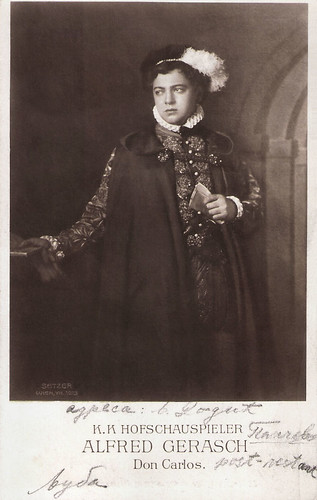
Austrian postcard. Phot: Setzer, Vienna, VII. 1913. Alfred Gerasch, 'K.u.K. Hofschauspieler (Royal and Imperial Court Actor) as Don Carlos in the homonymous play by Friedrich Schiller.
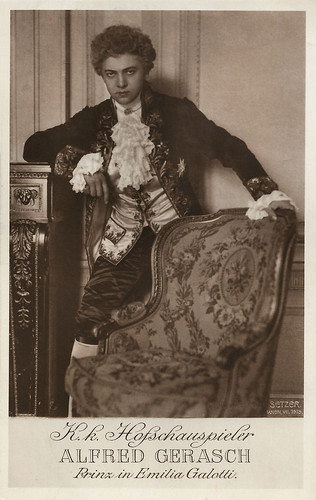
Austrian postcard by Postkartenverlag Brüder Kohn, Wien (Vienna), no. 887-1834. Photo: Setzer, Wien, 1913. Caption: K.K. Hofschauspieler Alfred Gerasch as the Prince in 'Emilia Galotti', a play in five acts by Gotthold Ephraim Lessing (1729–1781), which premiered on 8 March 1772 in Braunschweig (Brunswick).
Sources: Stephanie D’heil (Steffi-line.de - German), Thomas Staedeli (Cyranos), Wikipedia (German), and IMDb.
This post was last updated on 14 May 2024.

Austrian postcard by Postkartenverlag Brüder Kohn, Wien (Vienna). Photo: Setzer, Wien, 1913.

Austrian postcard by Postkartenverlag Brüder Kohn, Wien (Vienna). Photo: Setzer, Wien, 1913. Caption: "Prinz in Emilia Galotti." (Prince in Emilia Galotti). Emilia Galotti is a play in five acts by Gotthold Ephraim Lessing (1729–1781), which premiered on 8 March 1772 in Braunschweig (Brunswick). The work is a classic example of German 'bürgerliches Trauerspiel' (bourgeois tragedy). Lessing's work comprises an attack against the nobility and its powers. Lessing depicts aristocrats as having unfair powers in society and as ruining the happiness of the emerging middle class.
Royal court actor
Alfred Arthur Max Gerasch was born in Berlin in 1877. He took drama lessons from the singer, actor and temporary head director of the Berlin Victoria-Theater, Wilhelm Hock. Gerasch made his stage debut in 1896 at the Bellevue Theatre in Stettin, now Szczecin in Poland. In 1897 he moved to Hamburg, and later to Oldenburg and to Karlsruhe.
In 1907, he went to Vienna, where Paul Schlenthe had appointed him an ensemble member of the famous Burgtheater. He became very popular among the Viennese theatre audiences as the young hero and lover in plays like 'Romeo and Juliet' by William Shakespeare and 'Don Karlos' by Friedrich Schiller.
Many great roles in the classic plays followed including Orest in 'Iphigenia in Tauris' by Johann Wolfgang von Goethe. The charismatic Gerasch was named ‘kaiserlich und königlichen Hofschauspieler’ (Royal Court Actor). He celebrated triumphs as Duke Orsino in the Shakespeare comedy 'Twelfth Night', as Ferdinand in Schiller's Kabal und Liebe (Cabal and Love) and as Prince of Guastalla in 'Emilia Galotti'. Gerasch covered the entire spectrum of classical heroes, but was also convincing in modern plays, for example in the tragicomedy 'Das weite Land' by Arthur Schnitzler in 1911.
In 1919, the then 42-years actor made his film debut in the role of the son of the main character in the Austrian production Adrian Vanderstraaten (Robert Land, 1919), followed by films like Durch die Quartiere des Elends und Verbrechens/Through the Neighborhoods of Misery and Crime (Robert Land, 1920) and Eine Million Dollar/One Million Dollar (Jacob Fleck, Luise Fleck 1921). He returned to Berlin where he worked both for the stage and for the film industry during the 1920s.
In Joe May's melodrama Die Legende von der heiligen Simplicia/The Legend of Holy Simplicity (Joe May, 1920), he attracted the attention of cinema audiences as the knight Rochus, who tries to dissuade 'Saint Simplicia’ (Eva May) from her path. While Joe May cast Gerasch as the partner of his daughter Eva, the handsome actor appeared a little later alongside May's wife Mia May as Viscount Gaston de Cardillac in the tragedy Die Schuld der Lavinia Morland/The Guilt of Lavinia Morland (Joe May, 1920). Gerasch also appeared in Dagfin (Joe May, 1926) with Paul Richter, Eine Dubarry von heute/A Modern Dubarry (Alexander Korda, 1927) featuring María Corda, and Königin Luise, 2. Teil/Queen Luise, part 2 (Karl Grune, 1928) with Mady Christians.

Austrian postcard by Postkartenverlag Brüder Kohn, Wien (Vienna). Photo: Setzer, Wien, 1913. Caption: "Alfred Gerasch als Romeo." (Alfred Gerasch as Romeo). Publicity still for a stage production of the play Romeo and Juliet by William Shakespeare.

Austrian postcard by Postkartenverlag Brüder Kohn, Wien (Vienna), no. 887-1835. Photo: Setzer, Wien, 1913. Caption: K.k. Hofschauspieler Alfred Gerasch als Fiesko. Die Verschwörung des Fiesco zu Genua/Fiesco was the second full-length play by Friedrich Schiller. It is a republican tragedy based on the historical conspiracy of Giovanni Luigi Fieschi against Andrea Doria in Genoa in 1547. It premiered in Bonn in 1783 at the Hoftheater.
Historical Figures
After the introduction of sound film, Alfred Gerasch continued to play various supporting roles in films. Thanks to his stage experience, the now over 50-year-old actor had no problems with sound film. He played the landowner Baron de Lorche, father of Louis (Carl Balhaus)) in the German-Swedish melodrama Väther und Söhne/Fathers and Sons (1930), directed by Victor Sjöström and Paul Merzbach and based on the novel 'The Markurells' by Hjalmar Bergman.
He often appeared as historical figures including Czar Alexander I in Napoleon auf St. Helena/Napoleon on St. Helena (Lupu Pick, 1929) with Werner Krauss, the Austrian-Hungarian chief of staff, Baron Franz Conrad von Hötzendorf in 1914, die letzten Tage vor dem Weltbrand/1914, The Last days Before the World Fire (Richard Oswald, 1931), the Austrian statesman Prince Metternich in Marschall vorwärts/Marshal Forward (Heinz Paul, 1932), Talleyrand - Napoleon’s Minister of Foreign Affairs in Hundert Tage/Hundred Days (Franz Wenzler, 1935), and Field Marshal General Daun in Fridericus (Johannes Meyer, 1937) starring Otto Gebühr.
From 1937 on, Gerasch lived in Vienna, Austria and a few guest appearances were his only film work from that period. He did appear in Zauber der Bohème/The Magic of Bohème (Géza von Bolváry, 1937), a film operetta tailor-made to the dream couple Jan Kiepura and Marta Eggerth. For this film, he also served as co-author.
After 1945 Alfred Gerasch limited his work even more. His last film part was Roman emperor and philosopher Marcus Aurelius in the comedy Die Welt dreht sich verkehrt/The World Turns Upside Down (J.A. Hübler-Kahla, 1947) starring Hans Moser. He was 70 at the time.
Alfred Gerasch died in 1954 in Vienna.

Austrian postcard. Phot: Setzer, Vienna, VII. 1913. Alfred Gerasch, 'K.u.K. Hofschauspieler (Royal and Imperial Court Actor) as Don Carlos in the homonymous play by Friedrich Schiller.

Austrian postcard by Postkartenverlag Brüder Kohn, Wien (Vienna), no. 887-1834. Photo: Setzer, Wien, 1913. Caption: K.K. Hofschauspieler Alfred Gerasch as the Prince in 'Emilia Galotti', a play in five acts by Gotthold Ephraim Lessing (1729–1781), which premiered on 8 March 1772 in Braunschweig (Brunswick).
Sources: Stephanie D’heil (Steffi-line.de - German), Thomas Staedeli (Cyranos), Wikipedia (German), and IMDb.
This post was last updated on 14 May 2024.
No comments:
Post a Comment